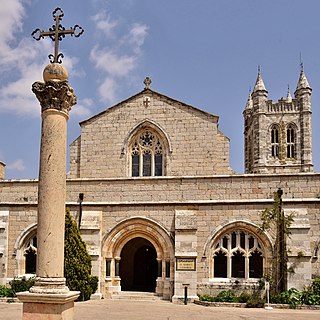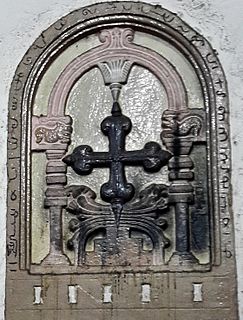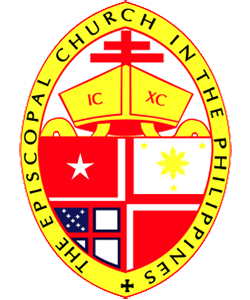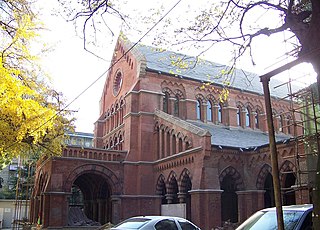
The Nippon Sei Ko Kai, abbreviated as NSKK, or sometimes referred to in English as the Anglican Episcopal Church in Japan, is the national Christian church representing the Province of Japan within the Anglican Communion.

The Episcopal Church of Jerusalem and the Middle East is a province of the Anglican Communion. The primate of the church is called President Bishop and represents the Church at the international Anglican Communion Primates' Meetings. The Central Synod of the church is its deliberative and legislative organ.

St. George's Cathedral is an Anglican (Episcopal) cathedral in Jerusalem, established in 1899. It is the seat of the Bishop of Jerusalem of the Episcopal Church in Jerusalem and the Middle East. It is located about two hundred meters away from the Garden Tomb, a popular site of Anglican, as well as other Protestant, pilgrimage and devotion.

Samuel Gobat was a Swiss Calvinist who became an Anglican missionary in Africa and was the Protestant Bishop of Jerusalem from 1846 until his death.

Christianity is India's third-largest religion after Hinduism and Islam, with approximately 27.8 million followers, constituting 2.3 percent of India's population .According to the tradition of Indian Christians, the Christian faith was introduced to India through Thomas the Apostle, who is said to have reached the Malabar Coast (Kerala) in 52 AD. According to another tradition Bartholomew the Apostle is credited with simultaneously introducing Christianity along the Konkan Coast. There is a general scholarly consensus that Christian communities were firmly established in the Malabar Coast (Kerala) of India by the 6th century AD, which were communities who used Syriac liturgies. Starting from European colonisations from 15th century several Western Christian communities like Latin Rite Catholics and Protestants were created in different parts of the country.

The Church of Uganda is a member province of the Anglican Communion. Currently there are 37 dioceses which make up the Church of Uganda, each headed by a bishop.

The Anglican Diocese of Jerusalem is the Anglican presence in Israel, the Palestinian territories, Jordan, Syria and Lebanon; it is a part of the Episcopal Church in Jerusalem and the Middle East, and based at St. George's Cathedral, Jerusalem. The diocese covers 7,000 Anglicans, with 35 service institutions, 29 parishes, 1500 employees, 200 hospital beds and 6,000 students. Today, Anglicans constitute a large portion of Jerusalem's Christians.
United Society Partners in the Gospel (USPG) is a United Kingdom-based charitable organization.
The Anglican-German Bishopric in Jerusalem was an episcopal see founded in Jerusalem in the nineteenth century by joint agreement of the Anglican Church of England and the united Evangelical Church in Prussia.

The Episcopal Church in the Philippines is a province of the Anglican Communion comprising the country of the Philippines. It was established by the Episcopal Church of the United States in 1901 by American missionaries led by Charles Henry Brent, who served as the first resident bishop, when the Philippines was opened to Protestant American missionaries. It became an autonomous province of the Anglican Communion on May 1, 1990.

St George's College Jerusalem (SGCJ) is a continuing education center of the Anglican Communion. It is an agency of the Episcopal Diocese of Jerusalem, with a mission to the local church within the Diocese, to the wider Anglican Church in the Middle East, and to the global Anglican Communion.
The Church's Ministry Among Jewish People (CMJ) is an Anglican missionary society founded in 1809.

Chung Hua Sheng Kung Hui, known in English as the Holy Catholic Church in China or Anglican-Episcopal Province of China, was the name of the Anglican Church in China from 1912 until about 1958.
The Episcopal/Anglican Province of Alexandria is a province of the Anglican Communion. Its territory was formerly the Diocese of Egypt with North Africa and the Horn of Africa. On 29 June 2020 the diocese was elevated to the status of an ecclesiastical province, and became the forty-first province of the Anglican Communion. The Primate and Metropolitan of the province is the Archbishop of Alexandria.
The Protestant Mount Zion Cemetery on Mount Zion in Jerusalem, is a cemetery owned by the Anglican Church Missionary Trust Association Ltd., London, represented by the Episcopal Church in Jerusalem and The Middle East. In 1848 Samuel Gobat, Bishop of Jerusalem, opened the cemetery and dedicated it as ecumenical graveyard for congregants of Anglican, Lutheran, Reformed (Calvinist) and old Catholic faith. Since its original beneficiary, the Bishopric of Jerusalem was maintained as a joint venture of the Anglican Church of England and the Evangelical Church in Prussia, a united Protestant Landeskirche of Lutheran and Reformed congregations, until 1886, the Jerusalem Lutheran congregation preserved a right to bury congregants there also after the Jerusalem Bishopric had become a solely Anglican diocese.

Bishop Vedanayagam Samuel Azariah was an Indian evangelist and the first Indian bishop in the churches of the Anglican Communion, serving as the first bishop of the diocese of Dornakal. A pioneer of Christian ecumenism in India, Azariah had a complex relationship with Mahatma Gandhi, who at least once called him postcolonial Indians' "Enemy Number One."

The Diocese of Iran is one of the four dioceses of the Anglican Province of Jerusalem and the Middle East. The diocese was established in 1912 as the Diocese of Persia and was incorporated into the Jerusalem Archbishopric in 1957. The most recent bishop was Azad Marshall, until 2016. His title is Bishop in Iran, rather than the often expected Bishop of Iran.
The Church Missionary Society in the Middle East and North Africa, operated through branch organisations, such as the Mediterranean Mission, with the mission extending to Palestine, Iran (Persia), Iraq, Egypt, Ethiopia (Abyssinia) and the Sudan. The missions were financed by the CMS with the local organisation of a mission usually being under the oversight of the Bishop of the Anglican diocese in which the CMS mission operated. The CMS made an important contribution to the Episcopal Church in Jerusalem and the Middle East.
The Church Missionary Society in China was a branch organisation established by the Church Missionary Society (CMS), which was founded in Britain in 1799 under the name the Society for Missions to Africa and the East; as a mission society working with the Anglican Communion, Protestant, and Orthodox Christians around the world. In 1812, the organization was renamed the Church Missionary Society. The missions were financed by the CMS with the local organisation of a mission usually being under the oversight of the Bishop of the Anglican diocese in which the CMS mission operated.

Saint Thomas Anglicans are the Saint Thomas Christian members of the Church of South India; the self-governing South Indian province of the Anglican Communion. They are among the several different ecclesiastical communities that splintered out of the once undivided Saint Thomas Christians; an ancient Christian community whose origins goes back to the first century missionary activities of Saint Thomas the Apostle, in the present-day South Indian state of Kerala. The Apostle, as legend has it, arrived in Malankara in AD 52.









